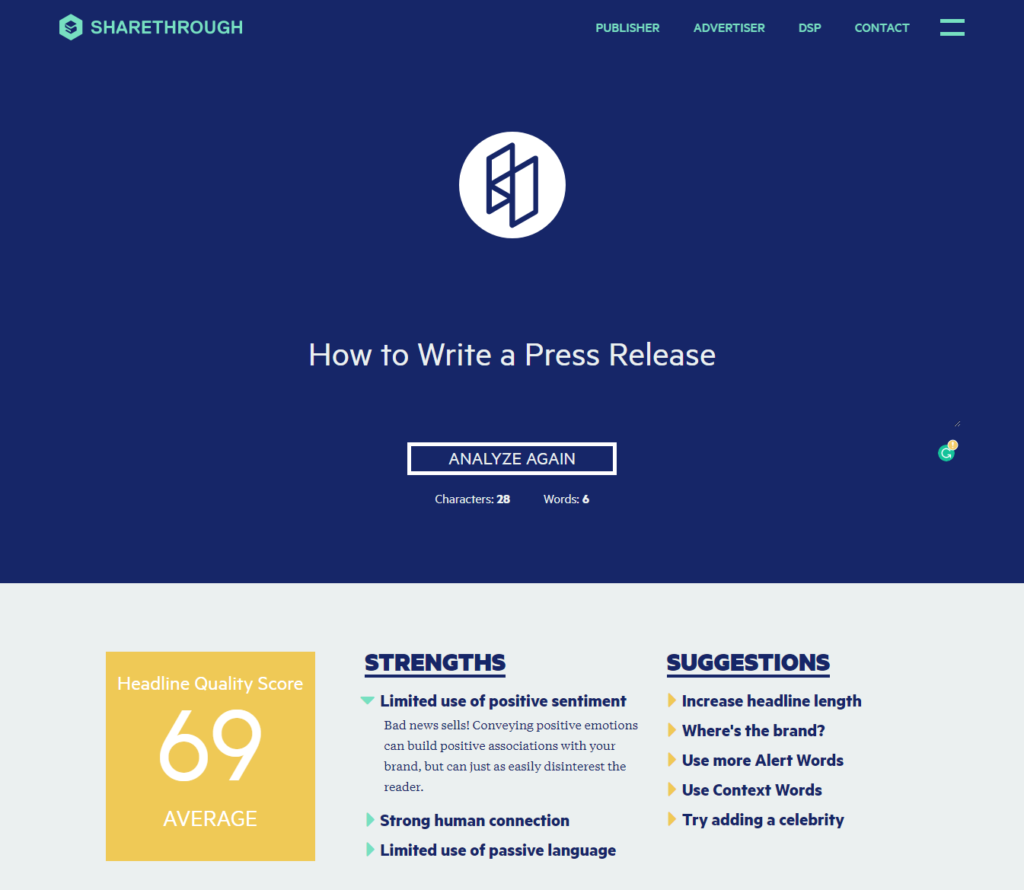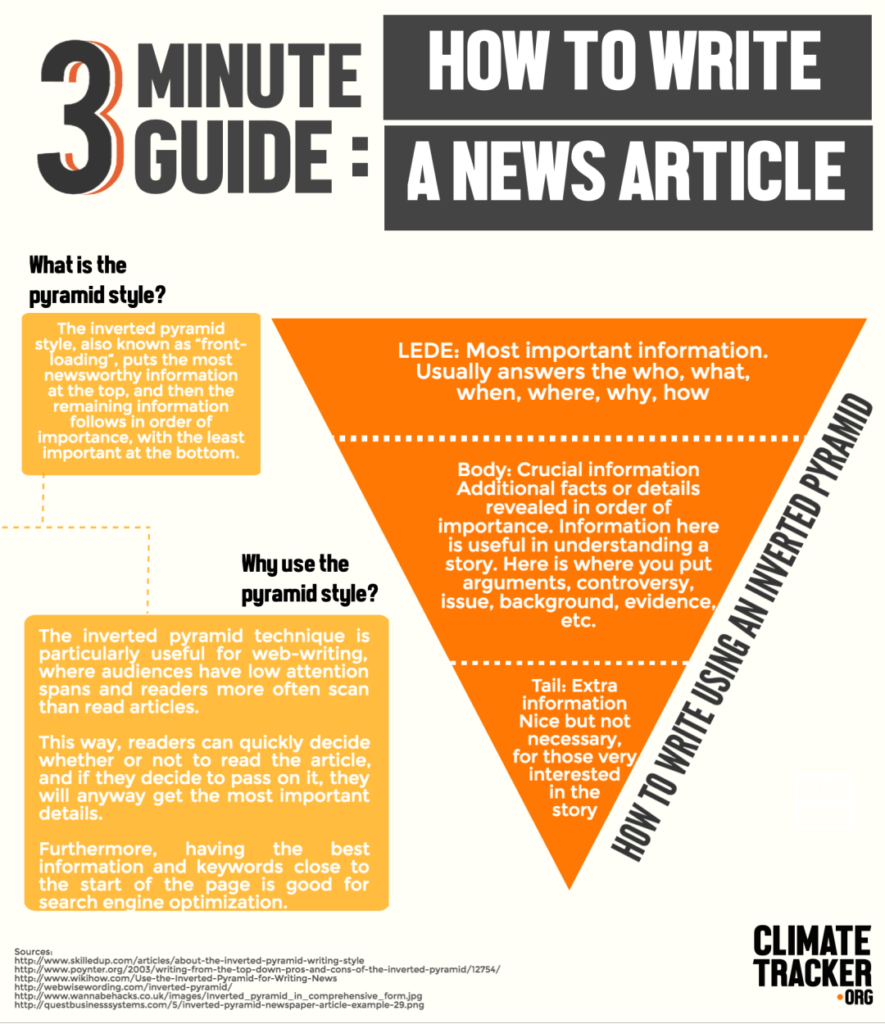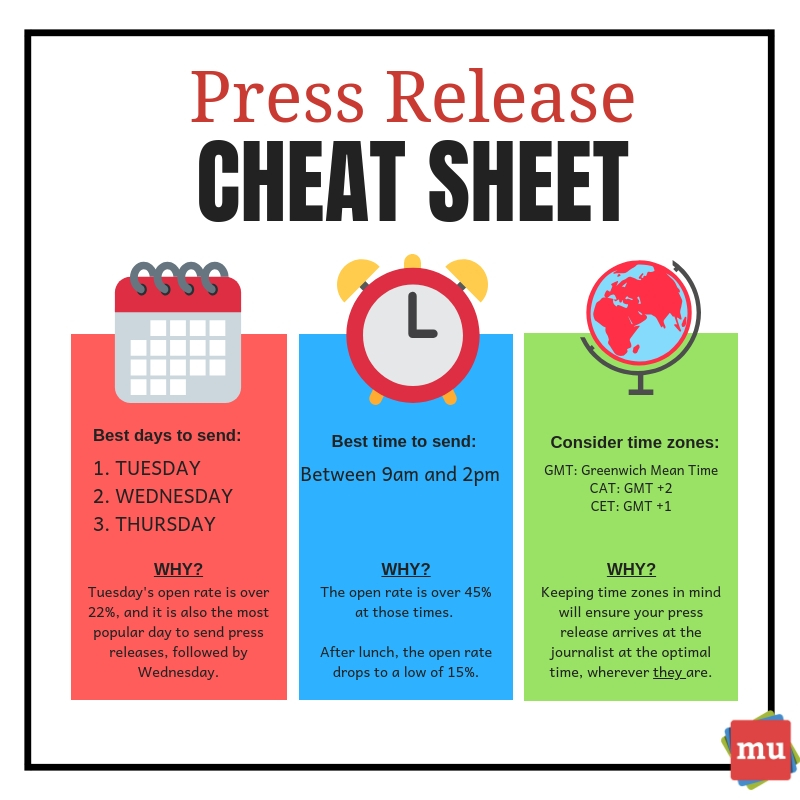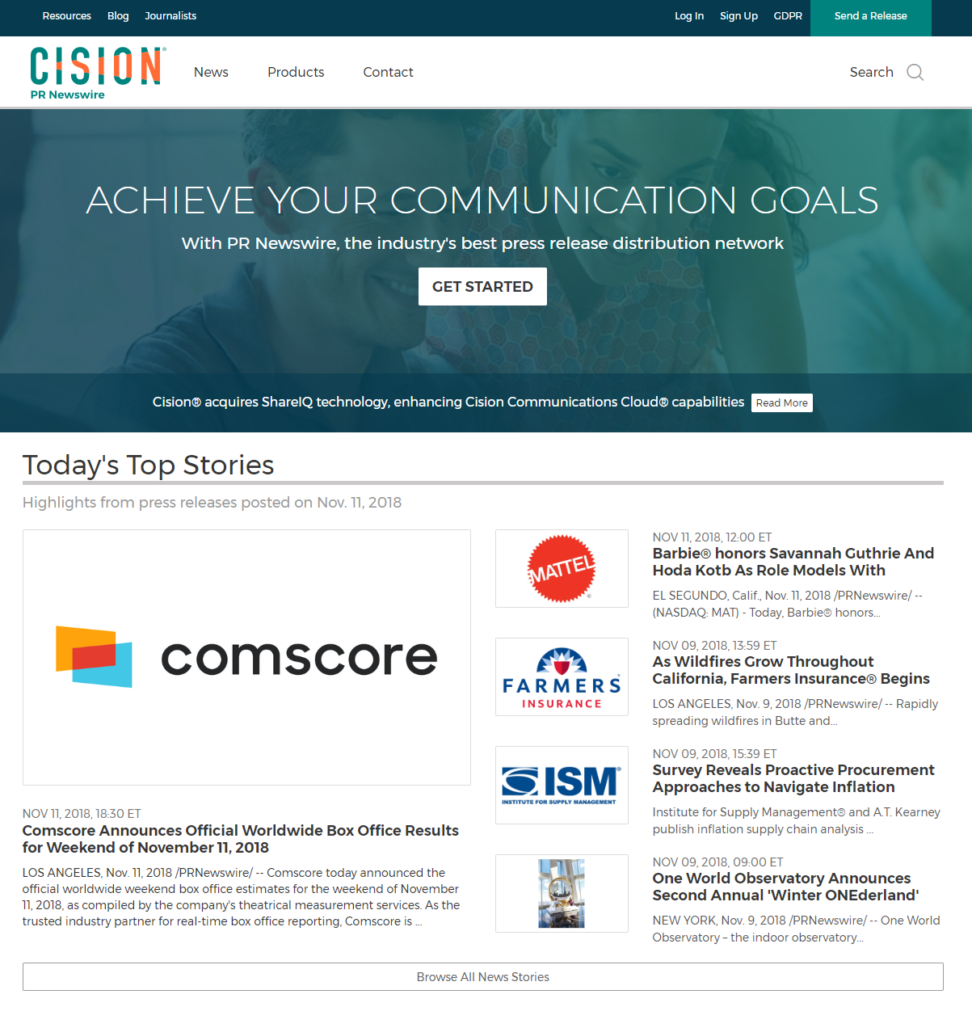When To Send Out A Press Release
- What is a Press Release?
- Why Would You Still Send A Press Release in 2021?
- Press Release Format and Template
- How To Write a Press Release: 7 Steps
- 5 Types of Press Releases (And Why They Work)
- Best Practices to Follow When Writing Press Releases
- When Should You Send a Press Release?
- Examples of Actual Press Releases
- How to Distribute Your Press Release
- Over to You
- Free Press Release Template Examples
What is a Press Release?
Before you learn how to write a press release, let's first understand what it is.
A press release (also known as a news release) is a brief document that shares something newsworthy you have done with the press and other media outlets.
It is usually sent to journalists and editors who may use the information to write a news article.
Note: A press release is a piece of content which is accompanied by a press release email pitching the story to the journalist – a sort of cover letter which summarizes the content in the release.
Why Would You Still Send A Press Release in 2021?
When you write a cold message to someone to sell on Instagram DM you're usually pretty straight forward and informal. A good press releases has those same qualities – it's designed to shock someone and make them curious to read more.
Here are the top reasons why you need to write a press release:
1. Garners attention and awareness
Journalists and media outlets have far more reach than your business alone, so it makes sense to use press releases to garner more attention and awareness.
2. Helps build relationships
Sending press releases is a mutually beneficial exercise. Journalists need stories – if you can help them with this, it could be the start of a relationship with someone in the media industry.
3. Improves your search engine optimization
If you can incorporate keywords efficiently, your rank for those keywords on search engines can shoot up. [Hint: I use SEOJet to always know what anchor text to use for each backlink.]
Also, if a journalist uses your contributions for an article or blog post, it could get you backlinks from their company's website (backlinks are one of the best ways to get your content to the top of a search engine).
4. You can manage your image
An effective press release is also a good way to control how your business is viewed. You can build your brand image and shape public perception through an informative official statement with facts to counter any negative publicity.
One major question you may have is:
When do you Need a Press Release?
Ideally, a press release is a viable outlet whenever you want to share content that's newsworthy.
But how do you decide if your content is newsworthy ?
For content to be considered newsworthy, there are a few factors that you need to take into consideration:
- Impact – is someone going to be affected by this information?
- Immediacy – is this urgent news?
- Recognition – is this about something well-known?
Most successful press releases satisfy at least two of those three criteria.
Press Release Format and Template
The next step in learning how to write a press release is understanding the press release format.
If your press release conforms to a format that a journalist is familiar with, your odds of getting published are higher.
IMPORTANT: Before you write a press release you MUST do something newsworthy, in other words have news which journalists actually want to cover!
Your hook for the story/finding you're pitching must be based on a trending topic journalists are covering right now.
Here's a typical press release format:
- Headline Which Grabs People's Attention: A title which grabs people's attention and clearly explains what the release is about – Is it a newsworthy study? A product launch?
- Location: Where you are and where the news is taking place
- Strong Lead: This is where you explain your newsworthy study/content in one sentence
- Body: This should be easily skimmable information provided in decreasing levels of importance. It's a very good idea to add in quotes throughout the body to back up your arguments.
- Boilerplate: A few words describing your company to the audience
- Press Contact: Name and contact details of your media coordinator or communications executive. Typically, anyone who the reporter can get in touch with to get more information.
Note: While there's no preferred font for your press release, sticking to a common font like Arial or Times New Roman is a good idea.
As you work through this post you'll write your first press release.
Please copy and paste this press release template outline below into your text editor to start writing the release:
[INSERT ATTENTION GRABBING HEADLINE]
Strong Lead Sentence
Summary Bullet Point One (if makes sense)
Summary Bullet Point Two (if makes sense)
Summary Bullet Point Three (if makes sense)
[DATE],[CITY], [STATE]
Introductory Paragraph
[QUOTE]
[Second Paragraph]
[Third Paragraph]
[QUOTE]
Closing Paragraph
[BOILERPLATE]
Name of Press Contact:
Phone:
Email:
How To Write a Press Release: 7 Steps
Here's your step-by-step guide on how to craft a well-written press release:
1. Find Ways To Be Newsworthy
As you'll be pitching to journalists, create a news release with that in mind.
Here's how to give journalists what they want:
Exclusive Data or Research
Journalists love anything exclusive. They also happen to love data. Giving them exclusive data in a media release is a good way of offering both.
Newsjacking
While you may not be able to provide journalists with your own breaking news event every time, you can use a content marketing process called newsjacking.
Simply put, newsjacking is the process of injecting your brand into a current news story to make it more relevant and eye-catching. For example, if something is viral on social media platforms like Twitter, tying your news release to it is a smart way to get traction.

Dmitry's take
Aligning your pitches to developing trends in your industry is a good way to make them more attractive. One easy way to spot these trends is to see what top journalists in your industry are writing about. Just search for your keyword on JRO to see a list of target journalists and their recent articles. When you use these trends in your pitch while still creating evergreen content, they will rarely be rejected.
Implement this tactic right now with our software.
Give It a Try Now!
Emotional Connection
Stories with an emotional connection resonate better with a target audience and lead to more social traction.
If you can get people emotionally invested in your brand, chances are your audience might be willing to give it a shot.
2. Write Your Press Release Headline
Your press release headline is the first thing anyone's going to see, so you have to make sure it's perfect.
The goal of your press release headline should be to get in, impress the journalist, and get out.
The three core tenets of writing a press release headline are:
- Use action verbs
- Be direct
- Be comprehensive
If you're still struggling with your headline, you could always try a headline analyzer to give you an idea of where you stand.

3. Craft Your Lead
Your lead is the first paragraph in your press release.
Usually consisting of 35 to 45 words, it summarizes the most critical parts of your press release.
This first paragraph has to answer the "5 Ws" as concisely as possible.
- Who: Who's involved in the news story? Which person or company is involved?
- What: What's happening? What's it about?
- When: When did this story or event happen? When is it going to happen?
- Where: Where did this story or event take place?
- Why: Why is this information relevant to a reader of these media outlets?
4. Write Your Body Paragraphs
The goal of the body is to describe all the relevant details of the story and your brand's involvement in it. The key word here is relevant.
Every great press releas e uses the inverted pyramid formula to do this:
You include the most pertinent details right at the top and then get into the less vital aspects as you go on.

5. Include Supporting Quotes
Including quotes is a good way to boost the credibility and personality of your press release to a reader. However, always ensure that your quote is relevant in the context of the article.
6. Write Your Boilerplate Text
Your boilerplate is a standardized copy of what your organization is and stands for. When you write a boilerplate, you are essentially condensing facts, business aspirations and marketing goals – all into one short paragraph.
You can even include your company logo here if you want to.
For a more in-depth look at how to write the perfect boilerplate, click here.
7. Add Media Contact Details
You need to include your media contact information for reporters to get in touch with you. Include your email id and phone number to give them a point of contact when they want to reach out to you.
5 Types of Press Releases (And Why They Work)
Here are 5 types of press release examples and why they have nailed it.
1. Product Launch Press Release
Take a look at this product launch PR Release from Apple. It has all the elements of a good press release in the perfect order.
Let's analyze them one-by-one.
The Headline
It's clear, concise and simple. It's also attention grabbing – something that's bound to attract reporters and customers.
The Location

Before the intro para or lead, it mentions where the news is taking place. In this example, the location is New York.
The Lead
The lead gets right to the point. The journalist knows that this is a new product release. They're also made aware of the various features that make this laptop so impressive to customers.
The Body
The body copy follows the inverted pyramid format to a tee.
It starts off by including a quote from a senior ranking official describing why this new release is a huge achievement for Apple. This establishes a human element that helps them reach their audience better.
The Boilerplate
There's a reason why the Apple boilerplate is a frequently used example for what a boilerplate should look like in marketing circles. It's clear, avoids jargon, lists out all their offerings, includes data and notes down what they strive to do.
The Media Contact
Not only does it mention the contact details of the PR agents, but also of the company's media helpline.
2. New Research Findings Press Release
There are a lot of things this press release example does well like the title, lead and quotes.
Note how the media release also follows the inverted pyramid formula well. At the start of the article, it distills the purpose of the robot into very easily understandable terms.
It's only towards the end of the article, after you've got a good idea of what the robot is, does it go into the technical facts and details.
3. Emergency Announcement Press Release
The first thing that strikes you about this press release example is how it's about something urgent – it focuses on something that's currently going on. It also focuses on something with an obvious social and emotional impact for a reader.
The body follows the inverted pyramid formula and includes a relevant quote as well.
However, unlike other types of press releases, this official statement includes the contact information within the body itself.
Usually, this break in structure wouldn't fit very well, but with the topic at hand, this is important information that deserves to be presented higher up in the press release.
4. New Hire Press Release
One important thing to keep in mind when crafting a new hire press release is that you mention the name of the individual and the designation they hold in the title itself.
This is especially important as the core of this official statement is condensed into those two points:
- Who is being hired?
- What's their role going to be?
Using the lead to note down the qualifications and past achievements of the individual is also a good idea. It gives reporters and editors better understanding of the individual's background and why this hire is noteworthy.
5. Award Announcement Press Release
When it comes to awards there are three key aspects:
- Who won?
- What was the award?
- Who gave the award?
Any press release that's about awards should keep these three aspects front and center. Ideally, all three of those components should be answered by the time the lead is up, as is done in this event press release.
Note: These five press release types aren't the only ones out there.
Sometimes you'll need a social media press release to appeal to social media influencers and bloggers. Sometimes you'll need a music press release template for certain events.
The list goes on!
Just use these examples we listed here as a guide to what usually works.
Best Practices to Follow When Writing Press Releases
Here are some key things to keep in mind when writing press releases for maximum media coverage.
1. Define Your Goals
When writing press releases, ask yourself – "What am I trying to achieve out of this?"
Is it boosting your social media following? Building brand awareness for a crowdfunding campaign? Tapping into physical media like newspapers?
It's important to identify this at the start because, in order to reach each of these goals, you'll have to adopt different strategies.
Remember a crowdfunding press release for a new innovation will look a lot different than a nonprofit press release looking for donations!
2. Put Yourself In Their Shoes
Remember, you're writing a press release for journalists. So when you're writing a press release, you'll have to adopt a journalistic style of writing.
How do you do that?
By thinking like one.
Journalists go through hundreds of pitches every day. The last thing they want to do is sift through tons of sentences to find out if it's relevant.
If relevant information is easily accessible in the title and lead, they're more likely to give it a chance.
Also, remember that they're not public relations professionals or influencers on social channels. That's why it's a good idea to keep your press release writing factual – not exaggerated.
3. Target the Right Beat
I cannot stress how important this is.
You could have the greatest media release ever, but if your sales pitch goes to the wrong journalist or publication, you're going to go nowhere.
There are two things to keep in mind when you're about to pitch your press release:
- Whether the journalist or publication you're pitching to covers the area that your product or service is involved in
- Whether the people who read their work align with your target audience
Think about it.
Can you imagine a book press release being sent to a publication who exclusively deals with music?
Their reader base isn't going to align with your target audience!
You can find out more about how to pitch to the right journalists and publications here.

Dmitry's take
To find high quality prospects easily, use JustReachOut as it gives you a list of journalists who have written about your specific topic, not just publishers. When you search for your target keyword in JRO, the software shows a list of journalists and bloggers along with their contact details. You can then send them an email pitch directly through JustReachOut.
Implement this tactic right now with our software.
Give It a Try Now!
When Should You Send a Press Release?
Just like in social media marketing, the timing of your content plays a huge role. The time you release a press release can make or break your chances of success.
You would ideally want to send a press release at a time when it can get the most exposure. Ideally, your press release should arrive at a time when reporters and editors are willing to go through it.
Here's a handy infographic about when you should send a press release for maximum media coverage:

Examples of Actual Press Releases
Here are a few examples of good press releases:
1. Product Releases
Bain & Company Launches NPS Prism, A New Business To Help Companies Create Game-Changing Customer Experiences
Marathon Brewing Releases Signature Beer, 26.2 Brew, Nationwide
2. Partnerships
Curacity Partners with CitizenNet to Turn Instagram into a Measurable, Revenue-Driving Platform for Hotels
Waterford Hotel Group and Waterton Forge Partnership to Grow Hospitality Footprint
3. Awards
Autosoft Recognized as a Best Place to Work in Pennsylvania Five Years Running
American Management Association (AMA) Named to 2019 Training Industry's Top 20 Leadership Training Companies List
4. New Hires
PolyOne Board Elects Dr. Patricia Verduin as Director
ICF Appoints Mark Lee to Lead Public Sector Group
5. Technical Releases
ProcessPro ERP Releases New Cultivation Management System
Collateral Analytics Launches A New Commercial Automated Valuation Model
How to Distribute Your Press Release
You can distribute your press release by personally sending it to journalists and news outlets or using a press release distribution service:
1. Distributing Personally
This method is more time consuming and requires you to have a list of established contacts for press coverage.
The upside to this, however, is the ability to personalize your pitches and build valuable contacts with people in the press industry.
Keep in mind that personalizing your pitches and using LinkedIn, Twitter or Instagram DM to pitch your business to journalists is a unique and overlooked way to get your note seen and opened by journalists and bloggers.
So while you might default to pitching over email, don't forget the power of DMs and social media.

Dmitry's take
While it can be complicated to manually create an email pitch campaign which is personalized for individual journalists, you can use a service like JustReachOut to make the process hassle free. Our software allows you to find the relevant journalists and send out targeted email pitches in small, curated batches with careful follow ups. It also tracks email pitch activity and notifies you of opens, clicks, scrolls and responses from journalists. You can use it to tweak your email message for higher success.
Implement this tactic right now with our software.
Give It a Try Now!
2. Press Release Distribution Through a Syndication Service

When you use press release distribution services like PR Newswire, it distributes your press release to thousands of news agencies, TV stations and major networks instantly.
The downside to using distribution services that you miss out on the opportunity to connect personally with media contacts and build relationships.
Additionally, this press release distribution method is costly as it usually costs $150- 300 per release. If you're looking for a free press option, this is NOT the route to take!
Send an email pitch to a journalist right now with JustReachOut.
Over to You
There you have it.
You're now armed with all the knowledge you need to craft the perfect press release that'll blow the socks off any journalist.
It isn't easy by any measure, but it's certainly doable.
So go ahead and follow these steps to get the media coverage you know you deserve!
As promised, below is the free press release template for four different occasions to make the job easier for you!
Free Press Release Template Examples
Here are 4 sample press release examples that you can use right away.
Just copy them into Google Docs or Microsoft Word, add your information, and you're good to go!
1. Product Press Release Template
2. New Research Finding Press Release Template
3. Award Announcement Press Release Template
4. New Hire Announcement Press Release Template
When To Send Out A Press Release
Source: https://blog.justreachout.io/how-to-write-press-release/
Posted by: conanthowen1991.blogspot.com

0 Response to "When To Send Out A Press Release"
Post a Comment